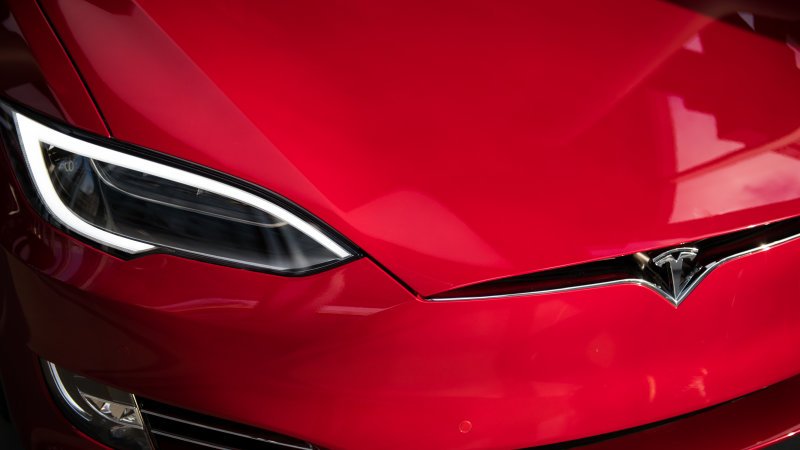Tesla employees report flawed parts are causing Model 3 delays

Days after it was announced that Tesla Model 3 production was halted in February, CNBC reports that the automaker is churning out a significant number of flawed parts leading to reworking and remanufacturing. According to two current employees who spoke with CNBC, this was causing significant delays on a car that's already behind the schedule Tesla CEO Elon Musk initially touted. This same facility builds the Tesla Model S and Model X.
Current and former Tesla employees told CNBC that the automaker's facility in Fremont, Calif., was producing a high number of defective parts. Tesla denies these reports, though a current company engineer said the output of flawed parts could be as high as 40 percent. This of course makes it hard to hit production goals. In July 2017, Musk said the automaker planned to produce 20,000 Model 3s per month by the end of the year. That number was later downgraded. The current estimate is 5,000 cars per-month by the end of June 2018.
Tesla has been bringing in teams to help deal with the high defect rate and the backlog of flawed parts. Team members come from service centers and remanufacturing lines where they regularly see what parts have problems. Reports say that Tesla has been sending parts from Fremont to its remanufacturing facility in Lathrop, Calif., rather than fixing them on the line. Tesla, too, denies that remanufacturing teams deal with rework.
Reworking and remanufacturing are two different things. Neither are unique to Tesla. Reworking refers to fixing an internal quality issue. Remanufacturing is fixing and restoring a part to be reused when repairing a vehicle or selling as certified pre-owned. Tesla says employees might be confusing the two processes. While many manufacturers use third-party suppliers for manufacturing, Tesla handles everything, from production to sales, internally.
Tesla has downplayed any potential manufacturing problems and said the production halt on the Model 3 in February was planned and intended to fix bottlenecks.
Update: We have a statement from a Tesla spokesperson.
Regarding CNBC: "Our goal is to produce perfect cars for every customer. That is why we review every vehicle for even the smallest refinement and conduct extensive end of line quality checks before a customer takes delivery of their car. Nothing speaks to this more than the fact that Tesla has the highest customer satisfaction levels and the highest percentage of customers who say that their next car will be a Tesla in the entire global auto industry. We care about even the smallest imperfections like a slight paint gloss texture or a wheel alignment check.
CNBC's recent story on quality at Tesla completely misses this critical point. In what world is the pursuit of perfection looked down on? Not one we want to live in.
As an example, every Model S or Model X on the assembly line must pass through hundreds of inspection and test points. In order to ensure the highest quality, dedicated inspection teams track every car throughout every shop in the assembly line to document and address potential issues. Towards the end of the line, every vehicle is then subjected to an additional quality control process involving more than 500 other inspections and tests.
The majority of issues identified at the end of line inspection are extremely minor, and are resolved in a matter of minutes. That said, we're working to reduce this work and make the process as efficient as possible. We then feed these improvements back to production in a pursuit of perfection.
This is reflected in the overall efficiency of the factory, which has improved dramatically. For example, the number of labor hours needed to complete a Model S or Model X vehicle has decreased. Whereas before, it took three shifts with considerable overtime to produce 100,000 Model S and X vehicles, now it can be done with only two shifts and minimal overtime.
Moreover, CNBC's focus on remanufacturing has nothing to do with the quality of our cars. Remanufacturing is a process that literally every automaker on earth performs. CNBC is extracting a few lines from two job descriptions posted online and making gross assumptions about the roles that are inaccurate. Our remanufacturing team is very small, comprising only 0.1% (40 people) of our nearly 40,000 employees. Any "expert" claiming there is something unusual about our remanufacturing or that it has something to do with the quality of cars that come off a production line is either very confused or just completely wrong. In reality, like other automakers, Tesla remanufactures parts because doing so uses fewer materials and less energy than building a new part from scratch. It is undeniably a good thing that is ultimately better for the environment and if well done is equally good for the customer."
Regarding production downtime: "Our Model 3 production plan includes periods of planned downtime in both Fremont and Gigafactory 1. These periods are used to improve automation and systematically address bottlenecks in order to increase production rates. This is not unusual and is in fact common in production ramps like this."
